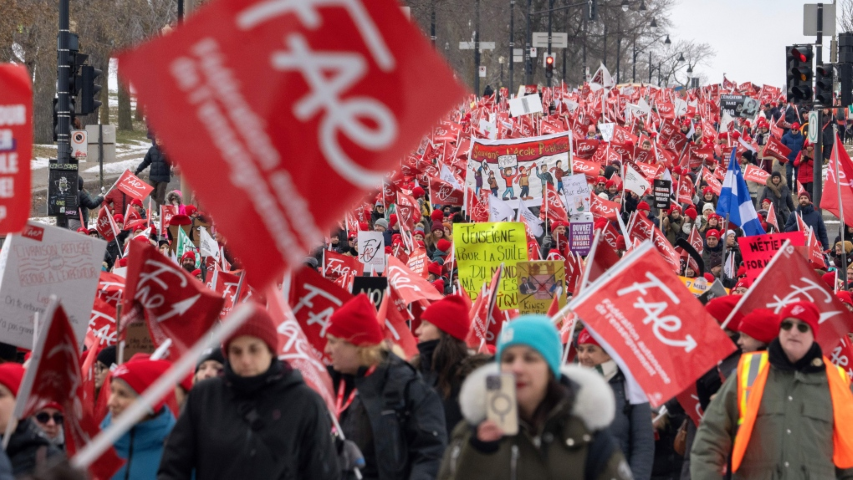
Teachers from the FAE union stage a march through Montreal streets on Tuesday, December 12, 2023, advocating for their contract demands. The event was documented by Ryan Remiorz for THE CANADIAN PRESS.
In a significant development, the Fédération autonome de l’enseignement (FAE), a union representing 40 percent of Quebec teachers, has reached a preliminary agreement with the government, bringing an end to a strike that has disrupted approximately 800 schools since November 23.
The FAE announced via social media on Thursday night, revealing that they spent the day evaluating the tentative deal with the province and plan to recommend it to their members for approval during general assemblies after the holiday season. However, specific details of the agreement remain undisclosed.
Characterizing the deal as "a new step," the FAE underscored the pivotal role of teachers in determining whether they feel their concerns have been adequately addressed by Premier François Legault's government.
In conjunction with this development, the union has ceased all pressure tactics, including the general strike that resulted in the closure of 800 schools, including those in Montreal, since late November. As a consequence of the strike, students affected by the FAE's actions could potentially be away from classes for nearly seven consecutive weeks if they return to school as scheduled in January.
Representing over 66,000 teachers, the FAE adopted a firm stance compared to other public sector unions negotiating contracts with the government, initiating an unlimited general strike.
Earlier in the day, the government disclosed tentative salary agreements with a coalition of unions, excluding the FAE, representing a substantial 420,000 public sector employees, including teachers and healthcare workers. These unions had engaged in sporadic walkouts totalling 11 days since November.
The sole major labour group without a finalized agreement is the nurses' union, Fédération interprofessionnelle de la santé du Québec, comprising about 80,000 members, which indicated that negotiations are still in progress.
Before the FAE's announcement, Sylvain Martel, spokesperson for the parents' group Regroupement des comités de parents autonomes du Québec, expressed optimism tempered with caution regarding the potential reopening of 800 schools after the holiday break.
Martel highlighted ongoing discussions among teachers, parents, and administrators on how students would make up for lost time. The methods, he noted, would vary due to the unequal impact of the strikes, with some parents facilitating home learning, others hiring tutors, and less fortunate students experiencing weeks of minimal to no educational engagement.
Acknowledging the challenges, Martel emphasized the resilience of the educational community, stating, "It's very difficult for students to go back to the same rhythm they were in November, so it's going to take a little while, but we'll get there."















